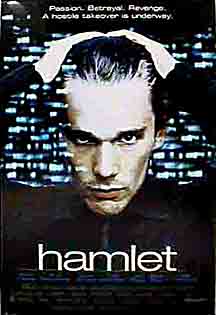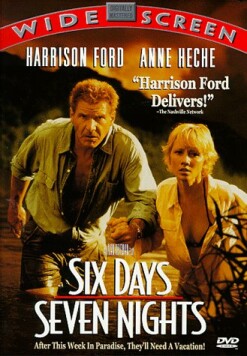Hamlet
Michael Almereyda’s extremely hip film version of Hamlet could have
given us a cogent reading of the play, if not necessarily exactly what it
deserves. Some important critics, starting from the undoubted fact that Hamlet
is a difficult and sometimes nasty character, a royal pain in the Elsinore, have
gone on to conclude that the murderer Claudius is the play’s real hero. John
Updike’s new novel, Gertrude and Claudius is based on the same premiss.
At first it seems that Almereyda is taking the play in some such direction by
emphasizing the most unsatisfactory aspects of Hamlet’s character: his rudeness,
his self-centeredness, his narcissism (he is rarely without his video camera)
and the related tendency to self-dramatization which results in madcap moments
embarrassing to everyone around him.
Moreover, Claudius (Kyle MacLachlan) is presented a dynamic leader of Denmark
Inc, a multinational corporation based in New York. At the opening
news-conference, where Hamlet skulks as he does in Shakespeare’s Act I, Scene 2,
only now with his camcorder, Denmark’s new c.e.o. wins applause by ripping up
the business section of USA Today whose headline announces a possible
takeover bid from Fortinbras. “So much for him.” Claudius and Gertrude (Diane
Venora) make an attractive couple and are obviously very much in love. Both the
contemporary setting and the view of Hamlet as a spoiled rich kid filled with
vague and unfocused resentment against his successful and admired stepfather
could be seen as true to Shakespeare’s intentions.
But it will soon dawn on the viewer that Almereyda is not attempting to tell
us anything interesting about the play. Instead, he only means to use it as an excuse
to lead onto the stage once again one of the movies’ favorite show-horses, the
moody, melancholy teen who, with the popularity of Holden Caulfield and James
Dean, became an American national icon in the 1950s. This by-now antiquated
young rebel-without-a-cause in Ethan Hawke’s performance is even more annoying
than usual because of the political sub-text, which seems to make his grievance
against his uncle less that he murdered his father and more that he’s rich and a
corporate chieftain, probably chopping down rain-forests right and left. One can
easily imagine this Hamlet among the Seattle protesters against the WTO.
As Mr Hawke plays him, Hamlet is a sort of fossil hippie, only truculent and
annoying to those over 30 (naturally, his own age, given by Shakespeare as 30,
is not mentioned). This makes him and Ophelia (Julia Stiles) into
co-conspirators against the alliance of Claudius-Gertrude and her father,
Polonius (Bill Murry). Accordingly, he does not appear here, as he does in the
play, in Ophelia’s closet pretending to be mad (or perhaps being mad). On the
contrary, he gives her a kiss instead. His soppy love-letters are the true
expression of his feelings—and his sensibility. When Polonius says to Claudius
of the letter that “this in obedience hath my daughter shown me,” he is
obviously lying, as Ophelia attempts to snatch it back from him.
Mr. Murray is in many ways an admirable actor, but he is not suited to the
portrayal of such a thuggish tyrant—who is in any case completely
un-Shakespearean. The scene in which he is presented as manhandling his
daughter, not without a hint of the sexually abusive father, in order to make
her “wear a wire” against her will during the “nunnery” scene and so entrap
Hamlet would be impossible for any actor to bring off. It is only when Hamlet
discovers the recording device in the process of giving her a shoulder massage,
that he stops being nice to her—and the manner of her death emphasizes that it
is his withdrawal of affection and not her father’s death which drives her to
madness and suicide.
In other words, all else in this version of the play is sacrificed for the
sake of the favored myths of the youth culture. As if to advertise what buttons
he is trying to press, Almereyda has Mr. Hawke not only surrounded by images of
James Dean, Che Guevara and Malcolm X but wearing for much of the film what
might have been Holden Caulfield’s famous hunting cap. Like Holden, this Hamlet
is a pathologically sensitive, too-good-for-this world type without any of the
textual Hamlet’s bloodthirstiness or savage self-criticism. Or any of his
Shakespearean humor or moments of self-detachment. Even the gravedigger scene is
cut, lest it interfere with the pathos of doomed youth.
Also because of the political sub-text, which we might call the Seattle
dimension, Gertrude (Diane Venora) is a curiously muted character. The evil
corporation is clearly patriarchal, and Gertrude’s implication in Claudius’s
evil is thus played down if not completely eliminated. This means that the whole
Freudian suggestion of which the last century made so much during the scene
between Hamlet and Gertrude in her closet is quite absent, and her love for
Hamlet finally proven as, instead of by accident she deliberately drinks the
poison to save his life. Here “come, let me wipe thy face” is said as she is
dying, an act of final, and emphatically maternal, tenderness towards him which
suggests that she has long since chosen loyalty to Hamlet over her love for “the
bloat king.”
One could go on. Of course the shockingly disregard for the pronunciation of
the verse is only what we should expect from a production so untrue to
Shakespeare in other ways. And by the end the political gimmickry—as when the
“what a piece of work is a man” speech is taken out of its context and put as a
voiceover at the beginning to the accompaniment of video images of bombers
dropping bombs—becomes gimmickry for its own sake. The “now might I do it pat”
scene takes place as Hamlet chauffeurs Claudius’s limousine (Claudius does not
notice), but the episode becomes pointless since Hamlet’s reasoning in sparing
him here (so that he will go to hell and not to heaven) is omitted. Presumably
it would not be understood.
Yet mention of Ophelia’s “chaste treasure” and the fact that Laertes (Liev
Schreiber) would “dare damnation” to kill Hamlet are left in. We know what these
words meant to Shakespeare, and to his audience, and to most of those who have
seen the play from his day to our own. But what (if anything) do they mean to
Almeyrda or the tremendously up-to-date figures he makes of Shakespeare’s
characters? No one ever bothers to tell us. The words, like the play itself, are
presumably mere ornaments for the egos of the director and his altogether hip
Hamlet.
Discover more from James Bowman
Subscribe to get the latest posts to your email.








